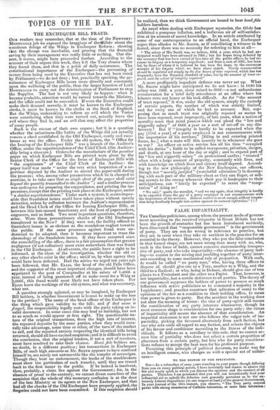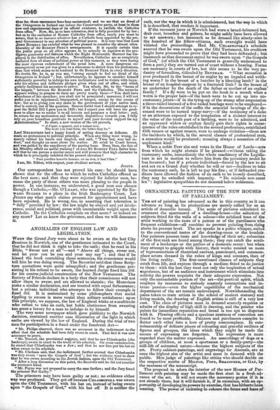FALSE IMPARTIALITY.
THE Canadian politicians, among whom the present mode of govern- ment according to the received etiquette in Great Britain has not been the growth of centuries but has been introduced suddenly, have discovered that "responsible government" is the government of party. They are not far wrong in reference to practice, but they are in error when they take an accident in the practice for an essential to the theory. However, they who put the false conclusion in that formal shape, are not more wrong than many with us, who, such is the force of habit, cannot conceive statesmanship irrespec- tive of party, and who take impartiality—the absence of party feel- ing—to consist in the mixing and jumbling together of party inter- ests according to some mechanical rule of proportion. With such, he would be called "no party man," who, having three offices to dispose of, should give one to a Tory, another to a Whig, and the third to a Radical ; or who, being in Ireland, should give one of two places to a Protestant and the other to a Papist. That, however, is not impartiality, but a servile deference to all parties. The theory of our government supposes the holders of power to possess so much influence with active politicians as to command a majority in the Legislature ; and practice construes that adhesion of many to the opinions of the few as a condition to their holding office, to mean that power is given to party. But the accident in the working does not alter the meaning of terms : the vice of party-spirit still means the consideration of any party interests whatsoever, though its most common shape is consideration for one party only ; the virtue of impartiality still means the absence of that consideration. An impartial statesman is not one who follows the vulgar rule of im- partiality, picking the favoured alternately from each faction, but one who sets aside all regard to any faction, and selects the objects of his favour and confidence according to the fitness of the indi- viduals. It follows as a corollary to this rule, that we cannot ac- cuse him of partiality who does not select a certain proportion of placemen from a certain party, but him who for party considera- tions refuses to accept the best men for his professed purpose. Premising this principle of political decorum, we make way for an intelligent censor, who charges us with a special act of unfair- ness—
TO THE EDITOR OF THE SPECTATOR.
Sta—As a subscriber of some years standing to your paper, though differing from you on many political points, I have invariably had reason to admire the fair and manly spirit in which you discuss the opinions and the conduct of all parties. Therefore am persuaded that you will not intentionally lend your
influential aid to uphold the delusion now generally prevalent as to the ex- tremely Liberal dispositions (in one respect at least) of the present Government. In your journal of the 16th instant, you observe, "The Tory party entered power with strong assurances of Catholic toleration, or more than toleration; thus far, these assurances have been maintained; and we see that no dread of the Orangemen in Ireland can induce the Conservative party, at least in these wew and experiment.1 days of its official existence, to exclude the Catholics from office. Now, Sir, as to bare toleration, that is folly provided for by law ; but as to the exclusion of Roman Catholics from office, surely you must be aware, that in no instance whatever has a Catholic been appointed by the pre- sent Government to any situation of political power. It is very true that Lord JOHN RUSSELL has extolled what he was pleased to consider the almost ultra. liberality of Sir ROBERT PEEL'S arrangements. It is equally certain that the public press on all sides appears to be actually in raptures at the pro- digious generosity and fairness which the Right Honourable Baronet has dis- played in the distribution of office. Nevertheless, Catholics are as completely excluded from all share of political power at this moment, as they were during the most rigorous enforcement of the penal laws. A more dangerous en- couragement never yet was given to a statesman to shrink from his professions, than that which seems to be tendered to Sir ROBERT PEEL in every direction. No doubt, Sir, he is, as you say, "strong enough to feel no dread of the Orangemen in Ireland "; but, unfortunately, he appears to consider himself sufficiently powerful to indulge his own inclinations and to violate with impu- nity his solemn and deliberate pledges given when out of office, and which greatly facilitated his accession to power. You allude, Sir, to the "terms of the bargain" between Sir ROBERT PEEL and the Catholics. The terms he appears willing to propose to them are pretty nearly these—" You shall have abundance of fair speeches; you shall not be persecuted; moreover, I will not suffer you to be imprisoned, transported, or hanged, except by due course of law; but as to giving you any share in the government of your native land, that is entirely out of the question. Heaven forbid that I should attempt to re- peal the Relief Bill I gave you in 1829; but I expect you will have the good- ness to allow me to render it to all intents and purposes a dead letter: and, In return for my moderation and favourable dispositions towards yon, I fully rely on your boundless gratitude to myself and your devoted support for my Administration." In short, a new version of the old proverb,
A Papist, a spaniel, and a walnut-tree.
The more you beat them, the better they be."
Lord MELBOURNE had a happy knack of setting decency at defiance. He made no pretensions to political principle. When any thing went wrong, he merely rubbed his hands and laughed, and said, "'Twas bad, very bad in• deed," and thought no more about the matter. He ruled by Court favour, and was guided by the expediency of the passing hour. Does, then, the fate of bis Ministry afford no useful warning ? or does Sir ROBERT PEEL flatter him-. self that he can pursue a similar career and still preserve that high character to which he is principally indebted for his present elevation ?
" Pour parottre honnite bonnie, en un mot, il faut litre."
Ism, Mr. Editor, with respect, your obedient servant,
Jurotes.
Our correspondent has not proved his case : he should have shown that for the offices to which he refers Catholics offered as the best men; and that they were rejected for inferior men, be- cause the party of these others was more pleasing to the people in power. In one instance, we understand, a good man was chosen though a Catholic,—Mr. O'Le.kay, who was appointed by Sir ED- WARD SUGDEN to a place in the Irish Bankruptcy Court. Let Jumus say what men's claims pressed for appointment and have been rejected. He is wrong, too, in asserting that toleration is " fully" provided by law : the law might be obeyed and yet intole- rance, social and political, press with unendurable weight upon the Catholic. Do the Catholics complain on that score ? or indeed on any score? Let us know the grievance, and then we will denounce it.



























 Previous page
Previous page